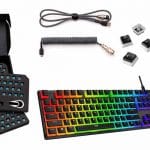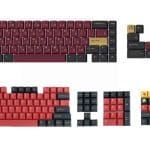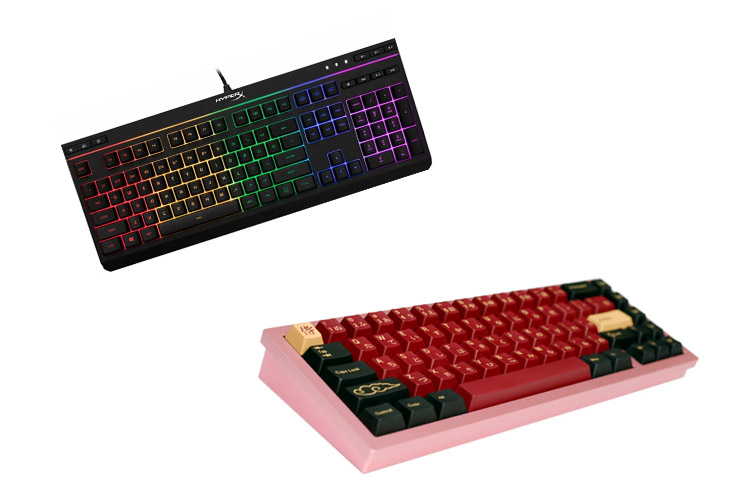
The demand and popularity of mechanical keyboards continue to rise along with the cost. Seeing how expensive mechanical keyboards can make some hobbyists wonder if they could use old membrane keyboards and convert them into mechanical ones.
Because of the different structures between the two keyboards, it is generally impossible to convert a membrane keyboard into a mechanical keyboard. Even if you could convert them via PCB swaps or other methods, the cost would make it impractical. Consumers who want a mechanical keyboard are better off buying a budget mechanical keyboard.
With all the old keyboards sitting around, it would be cool if you could easily convert your pre-existing membrane keyboard into a mechanical keyboard rather than paying for a brand new mechanical keyboard.
Unfortunately, things aren’t that simple. And in most cases, general users are better off just buying a brand new mechanical keyboard.
In this article, we will be diving deeper into the topic. We’ll go through some of the possible methods used for the conversion but ultimately why we think it’s better to build or buy a new mechanical keyboard simply.
Can You Convert a Membrane Keyboard to a Mechanical Keyboard?
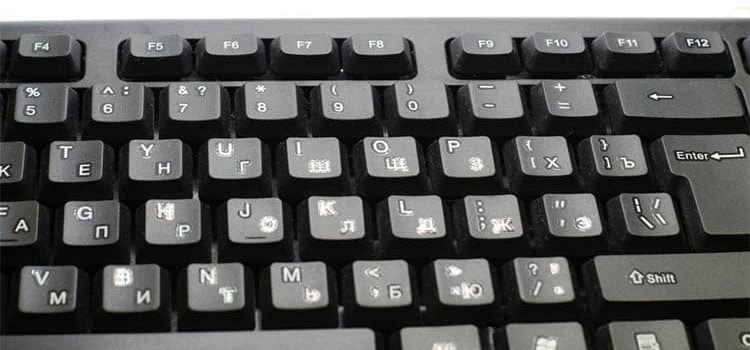
The short answer is no. The longer answer is sort of, but not really.
The difference between membrane keyboards and mechanical keyboards presents a large hurdle to overcome, preventing any conversion. This hurdle would be how the two keyboards are fundamentally different in build and make due.
The mechanism affects what each keyboard may use (aka either individual switches or a membrane pad) and the layout for the circuit board placed underneath all keyboards to send the key registers to the computer. Any tinkering could even lead to irreversible damage. Some membrane keyboards’ pressure pads cannot simply be removed like a normal mechanical keyboard, as removing it can cause damage that may not be reversible.
To dismantle any keyboard, you need some technical know-how about computer hardware and software. If done incorrectly, permanent damage isn’t too far off, and careless handling could damage circuitry. Aside from the technicalities, you would need soldering equipment and knowledge just to put it all together. Converting keyboards isn’t an activity for any casual computer user, but it isn’t impossible.
Why Would You Convert Your Membrane Keyboard?
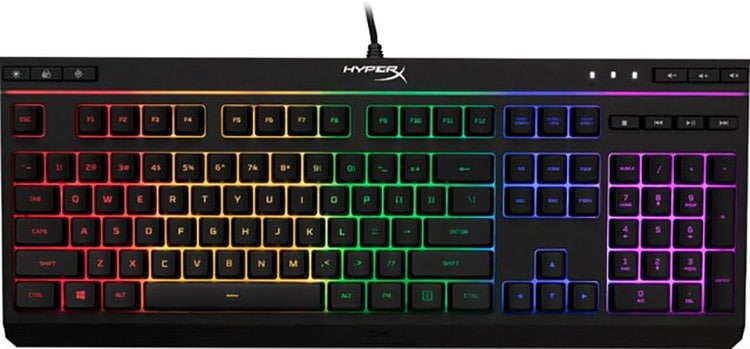
There are more than a few good reasons to convert the standard membrane keyboard into a mechanical one. First and foremost, though, is that there’s a good chance someone had seen praise for the mechanical keyboard and all its features and wanted to see if they could make one instead of buying one.
Not entirely surprising, as mechanical keyboards have had a large boom in terms of positive coverage in both mainstream news outlets to obscure personal blogs. The tactility, the sound, and the improved precision all make for a good picture, and that picture often lures in anyone who uses the internet into wanting to try it all out for themselves.
Then, there are enthusiasts. Enthusiasts are in the sphere of the mechanical keyboard market who own more than one or two keyboards. They collect them and build them as a hobby, have a strong interest in computer tech, and likely learn enough about them to do any modding feasibly. If anything, modding – which is to say, modifying keyboards for whatever purpose – is a normal activity within the niche. Out-of-box keyboards may not perfectly suit the user’s needs, so enthusiasts tweak their keyboards and make changes that can modify everything down to the specific tone of their keyboards to be satisfied.
Enthusiasts could attempt to convert a membrane keyboard to a mechanical keyboard out of pure curiosity and to see if they could cobble together a keyboard that’s somewhere approaching useable. The hobby sphere of the market has, after all, made keyboards out of cardboard for sheer enjoyment, and it wouldn’t be far off to see enthusiasts try this particular conversion to see if they could.
The Process – How to Convert Your Membrane Keyboard into a Mechanical Keyboard
As aforementioned, converting a membrane keyboard to a mechanical keyboard is not for the casual computer user, but it isn’t impossible. There have been some attempts already by enthusiasts.
What you need would be; special equipment, knowledge on how to use that equipment, how to use that equipment on computer hardware, knowing enough about the hardware to construct and de-construct everything.
Simply put, you’d need soldering equipment and know-how to solder and desolder computer hardware and work with the circuitry. If you don’t have that equipment already, buying it would likely be far more expensive than a standard budget mechanical keyboard. If you don’t know the circuitry, you may not know what and where to solder. Even then, things may not fit well to whatever keyboard body you may have bought for this project.
But, generally, if you really want to try the conversion:
Dismantle
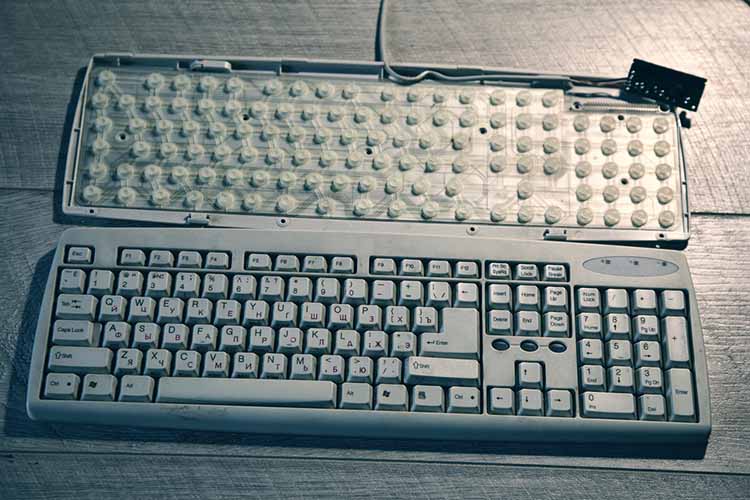
Take the keyboard apart. Unscrew all the screws and lay out all the parts to see and keep track of them. Line your keycaps, and set the bottom frame and PCB (Printed Circuit Board) safely aside. Depending on the keyboard you’re working with, the membrane layer could be completely separate from the board or be pressed and soldered to the PCB.
Separate
Once the keyboard has been dismantled and everything stripped down and set aside, take on the membrane layer attached to the PCB and separate them. Once again, depending on the keyboard, the membrane layer could be a simple pressure fit, clipped on, or soldered to the PCB. Should it be soldered, you’d need to know how to desolder it without damaging anything.
Fitting
And so comes the real test: It’s not too complex to try and solder the mechanical switchboard to the PCB, given you know what you’re doing, but there’s never a guarantee that it can even line up in such a way that you can solder it on. There’s no way to know until the membrane keyboard has been completely taken apart, and by that point, the damage could be irreversible. It’s best to fit everything as best you can and see if the keys are viable for the standard keyboard body.
Summarily, you would need to take the keyboard apart carefully, separate all components without damaging them, and hope that the circuitry all lines up in correct order so it can build an acceptable keyboard.
Why Should You Buy a Mechanical Keyboard instead?
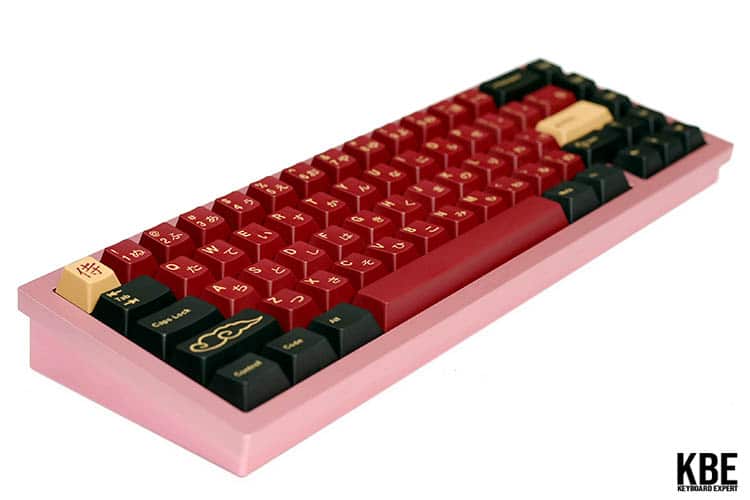
For enthusiasts, they may not want to spend the time to convert a membrane keyboard and find it too tedious to attempt. But for those who want to try the project as a hobby, buying a mechanical keyboard would be completely outside the point.
But for everyone else, it’s best to buy a mechanical keyboard outright. Your set of requirements for even attempting to convert a membrane keyboard to a mechanical keyboard involves soldering equipment and know-how and computer hardware knowledge. This doesn’t even factor in the cost to buy all the individual switches and keyboard base and other mechanical keyboard parts.
Practically, buying a mechanical keyboard outright would save you both time and money, and you can try it without having to buy individual parts or learn something new entirely to attempt it. You don’t need to buy an expensive mechanical keyboard from the get-go, after all, and anyone who wants to try it should buy a keyboard within their budget instead of trying a DIY approach.
Lastly, buying a higher-end mechanical keyboard from reputable vendors and manufacturers such as KBDFans, Cannonkeys, Novelkeys, KPRepublic, etc., would give you a much better product than a DIY converted membrane keyboard. It would allow you to have a keyboard with the aesthetics, sound, and feel of the high-end keyboards that you often see posted by enthusiasts on social media. We highly recommend checking out our in-depth brand reviews of these keyboard builders for those interested in custom keyboards.
Stephen is the head content creator of Keyboardsexpert. His mechanical keyboard journey began in 2014 when he got his Razer Blackwidow. Since then, he has been fascinated with all things mechanical keyboard-related. He later discovered the custom keyboard hobby and fell in love with the vast customization options. He is currently searching for his endgame and is very excited to share his journey and educate other keyboard enthusiasts.

